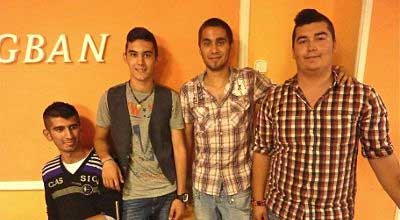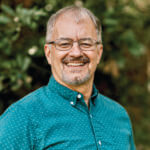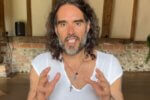When I washed the feet of a Gypsy pastor in Hungary last week, it felt like a wall came crashing down.
More than a few times in my travels the Holy Spirit has asked me to wash someone’s feet.· Once this happened in India, when I was with pastors from the lowest caste in Andhra Pradesh. Another time I was with South American pastors who were bitterly divided. It happened again last week when I was in a small Gypsy village in Hungary just a mile from the Ukrainian border.
Washing feet isn’t something I plan on doing during a missionary trip. I don’t travel with a large bowl (it fits awkwardly in a suitcase) and I never pack towels. But as I was driving with my friends Zsolt, Attila and Vera from Debrecen to Uszka, the Lord gave me that familiar nudge. I asked Zsolt to call and make sure a bowl and towel were ready when we arrived.
“During the Nazi era the Romanis were shot on sight or sent to prison camps for extermination. It is estimated that between 220,000 to 1.5 million Gypsies were killed during the World War II era. Because census records were not kept, the exact number is anyone’s guess.”
I know only a little about the struggle Gypsies have faced in Europe. Officially called the Romani people, their origins are mysterious. For years they were called Gypsies because it was assumed they wandered to Europe from Egypt. One legend suggests they were evicted from their Egyptian homeland because their ancestors helped protect the infant Jesus when His parents fled there to escape King Herod’s sword.
But today it is widely believed Gypsies began their journey in India, and their darker hair and complexion match that theory. No one knows why they moved so far away or why they didn’t bring Hinduism with them. Some researchers believe they could have been evicted from India because they refused to adopt the majority religion there.
Whatever the case, the history of the Romani people is sad. They are the ultimate underdogs, sharing a social stigma familiar to other minorities. Their ancestors were nomads; today they are some of Europe’s poorest people. After their arrival in Europe during medieval times they were abused, subjected to forced labor, enslaved and sometimes sterilized.
During the Nazi era the Romanis were shot on sight or sent to prison camps for extermination. It is estimated that between 220,000 to 1.5 million Gypsies were killed during the World War II era. Because census records were not kept, the exact number is anyone’s guess.
Because of the rejection they’ve suffered—and the anti-Gypsy bigotry that continues today—many of them struggle with alcoholism, drug addiction, family breakdown and high crime rates. Like Native Americans, they feel forgotten and misunderstood.
Yet their story is changing today. In spite of their social problems, many Gypsies have embraced faith in Christ in recent decades. With their vibrant passion and energetic music, they have unleashed a louder, more Pentecostal version of Christianity that is in stark contrast to the traditional religion of Europe.
This energy was on full display when I arrived at Pastor Edgar Kováks’ church in Uszka. It is one of the largest Gypsy congregations in Hungary, having experienced several waves of Holy Spirit renewal. Today the church’s worship is led by a group of young Romani men (including two of Pastor Edgar’s sons) who want to reach their generation for Christ.
In my message that night in Uszka I reminded the crowd that after the day of Pentecost, the Holy Spirit led Peter and the other disciples to cross forbidden racial barriers. Peter preached to Italians in Cornelius’ house, while Philip went to Samaritans and an Ethiopian. Barnabas went to Cyprus, and Paul carried the gospel to Greece, Italy and beyond.
In other words, no one is excluded from the boundless love of God. When Peter saw that the Holy Spirit had fallen on Cornelius’ Gentile relatives, he said: “I most certainly understand now that God is not one to show partiality, but in every nation the man who fears Him and does what is right is welcome to Him” (Acts 10:34-35, NASB). This is good news to Gypsies, and any other marginalized ethnic group that has suffered because of their skin color or racial heritage.
When I began to wash Pastor Edgar’s feet that night in front of his congregation, many of the people began to weep—and I couldn’t hold my tears back either. Then I asked Zsolt, a white Hungarian pastor from Debrecen, to join me. More tears flowed as he washed his Romani brother’s feet.
All this was more than a show of unity or a prophetic act of repentance. It felt as if a spiritual wall came crashing down as Zsolt and I copied what Jesus did for us. The Savior humbled Himself, became human flesh and came to this dirty world to touch every race with His love. He invites us, wherever we are, to do the same.
J. Lee Grady is the former editor of Charisma and the director of The Mordecai Project. You can follow him on Twitter at leegrady.

J. Lee Grady is an author, award-winning journalist and ordained minister. He served as a news writer and magazine editor for many years before launching into full-time ministry.
Lee is the author of six books, including 10 Lies the Church Tells Women, 10 Lies Men Believe and Fearless Daughters of the Bible. His years at Charisma magazine also gave him a unique perspective of the Spirit-filled church and led him to write The Holy Spirit Is Not for Sale and Set My Heart on Fire, which is a Bible study on the work of the Holy Spirit.








Leave a Comment
You must be logged in to post a comment.